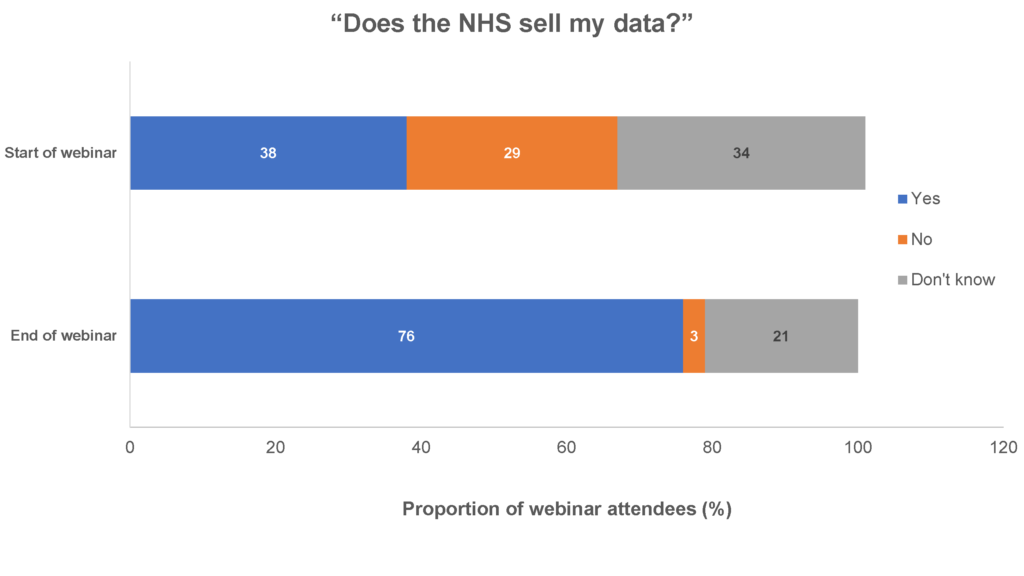
Elizabeth Lloyd-Owen of use MY data explains why transparency and plain language are central to inspiring public trust and confidence around the commercial use of patient data.
A recent report published by the Tony Blair Institute for Global Change called for a new approach to the use of healthcare data to support medical breakthroughs.1 The report proposed a public private partnership in the form of an ‘NHS Data Trust’ that would see commercial investment unlock the research potential of the anonymized patient data within the UK National Health Service (NHS). The report avoids any direct mention of ‘selling data’, but most media reactions explicitly led on this theme, illustrated by the BMJ news headline: Sell access to NHS data to boost health innovation, say Blair and Hague.2
The widespread reactions to the report are of little surprise to us at use MY data. In the UK, we are the only independent body of patients, relatives and carers focusing on the use of patient data to save lives and improve outcomes. Believing that patient data underpins medical research, we champion responsible, accountable and transparent data usage, and run events aimed at patient and public education on data-related matters. Our activities are designed to build a relationship of confidence and support between patients and researchers, whether they work in the commercial or in the public sector.
From an advocacy and campaigning perspective, use MY data members have developed core transparency principles governing patient data usage and have published a patient data citation statement that recommends appropriate acknowledgement of patient data usage. Following a public webinar that we held in late 2022 to examine whether the UK NHS was selling patient data, the media reaction to the report by the Tony Blair Institute for Global Change came as little surprise.
At the start of our webinar, 38% of attendees believed that the NHS was selling data, but this increased to 76% after listening to the presentations and discussions of leading experts on patient data usage (Figure 1). Yet, the delegates also recognized that the commercial value of patient data is not inherent in the data themselves but in the insights that the data can generate. Transparency around these insights was thought to be necessary in order to appreciate the true value of patient data.

On the topic of valuable insights, another lesson from the webinar was that language choice is important when communicating with the public about data usage. Terms that are commonly used in professional healthcare settings – such as ‘industry’, ‘commercial’, ‘innovator’ and ‘pharma’ – are not widely understood by the public and can arouse suspicion or anxiety.
With these insights in mind, it is unsurprising that a lack of context and clarity around the concept of an NHS Data Trust may induce public suspicion. The data held by the NHS has immense potential to improve health outcomes, but if people perceive that their personal data is being sold or exploited for profit, and without appropriate privacy safeguards, many millions will exercise their right to opt out. Every person who opts out of data sharing represents an opportunity missed. Margaret, a cancer patient and use MY data member, captures the sentiment well: “As a patient, I have a responsibility to the rest of society in permitting my data to be used, but I also have the right to ask … or … rather demand, that my data is used … for purposes of audit, comparison, research, ask questions and find answers for me and all the other patients like me.”
The bigger questions for use MY data members are not whether data are being sold or not, but why so little patient data is actually being used to advance care, and why the NHS isn’t doing a better job of including patients at the heart of decision-making relationships with commercial researchers.
You may also be interested in our recent Members Education Session “What does my health data look like?” available here.
The views expressed in this blog post are those of the author and do not necessarily reflect the views of Open Pharma or its Members.
References
- Bradshaw A, Heitmueller A, Kakkad J et al. Tony Blair Institute for Global Change. A new national purpose: leading the biotech revolution. Available from: https://www.institute.global/insights/politics-and-governance/a-new-national-purpose-leading-the-biotech-revolution (Accessed 16 February 2024).
- O’Dowd A. Sell access to NHS data to boost health innovation, say Blair and Hague. BMJ 2024; doi: https://doi.org/10.1136/bmj.q225.
Elizabeth Lloyd-Owen is use MY data’s Communications and Media Lead working on behalf of use MY data members.






